Edition
Rescuing forgotten voices means recovering word in all its forms: the spoken word, the heard word, the written word, and also the written word, which is often the only direct material that comes to us from many women. If it's true that the impact of the poetic creations resulting from the VENTRILOQUIA project could be long-lasting in the memory of the spectators and participants (after all, memory is the organic archive par excellence), it's also true that the material produced by these women deserves to have its physical support, guaranteeing its immortal place in the history of Portuguese literature.
The works published in the VENTRILOQUIA Collection are carefully selected examples, both for their diversity (conceptual, experiential, geographical) and for their proximity to the shows performed, in an editorial collaboration with Livraria Tivre de Papel.
Maria da Graça Varella Cid
Incomplete Poetry
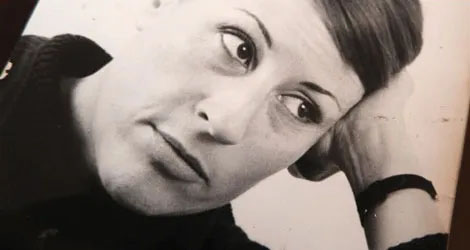
Poesia Incompleta (Incomplete Poetry) is the first book in the Ventriloquia collection by UMCOLETIVO and Tigre de Papel, which aims to publicise the works of women who wrote in Portuguese in the 20th century.
"Publishing Maria da Graça Varella Cid's Incomplete Poetry, in the year in which the author would have celebrated her ninetieth birthday, is an urgent gesture, albeit belated, because of its inherent justice and beauty. Maria da Graça Varella Cid published poetry titles such as Ao Nascer do Sol (1945) or Êxtase (1948), which she later rejected because they were written when she was still very young and therefore at a time when her writing lacked the maturity that she would later recognise as her own. The formal, rhythmic and melodic search - perhaps even more than the thematic ones - shape the writer's poetry: meticulous in every poetic beat, in the sonority with which the words embrace each other and in the time they need between them to form breathed ideas. As an adult, Varella Cid published Tríptico de Sábado (1963), Perfeito do Indicativo (1982) and Demonstração a Giz (1984). After his death, Acto do Corpo (1996) was published. There is mention of two unpublished texts that have not been found and, finally, the hitherto unpublished The Invincible Armada and The Pause and the Place." (From the Foreword by Cátia Terrinca and Ricardo Boléo.)
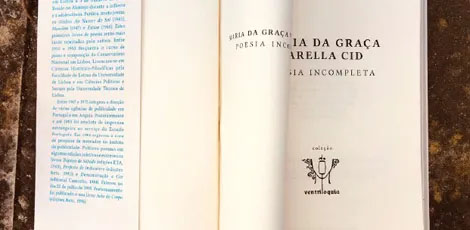
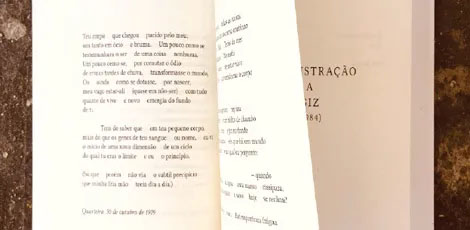
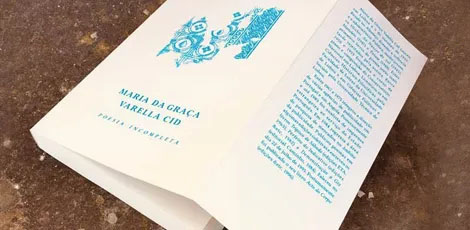
The debut launch of the book POESIA INCOMPLETA took place at the SÃO LUIZ Theatre on 10 February 2023, with the presence of Cátia Terrinca and Ricardo Boléo (UMCOLETIVO) and Fernando Ramalho (Tigre de Papel).
The book is on sale at bookshops in Lisbon, including the Paper Tiger Bookshop and Snob Bookshop
| author | Maria da Graça Varella Cid |
| publisher | Paper Tiger |
| year of publication | 2023 |
| no. of pages | 424 |
Maria João Carvalho
After Mars

Maria João Carvalho was born on 24 June 1961 and was a war reporter in Angola, Croatia and Bosnia, first for RTP, RDP, Diário de Notícias and Tal & Qual, and then for SIC, Renascença and Diário de Notícias. She was a journalist for Lusa, EuroNews, Macau Hoje, RGT-Rádio Gest and correspondent for the newspaper Expresso in the Cape Verde Islands; she has collaborated with Homem Magazine, the magazine of the Instituto do Emprego e Formação Profissional and regional newspapers throughout the country. She is a founder of the Portuguese Association of Young Journalists. She has exhibited war photographs in Macau, mainland Portugal and the Azores and paints in acrylics. She published the book Da guerra e outros poemas (GRESFOZ, 1997) and the short stories A Cobra and UMA in the Coletânea Gabravo (Artdomus, 2002). Maria João Carvalho also goes by Janine de Medeiros. We are now publishing diaries and poems that correspond to different geographies and coordinates, but the feeling remains that it may always be the same place: Sarajevo, Palestine, Ukraine, Angola... The places where Maria João Carvalho has been and where she hasn't are mixed up in the idea that the imminence of war is more voracious than the fear or disregard we may have for those that have happened, those that are happening now or those that will happen with or without prior warning. Peace is precious and must be cared for: like love or the temperature of a cup of tea or the sharing of a biscuit. Maria João Carvalho's war diaries are an important historical-political document and are a punch - several punches! - in the stomach. The poems are the counter-cycle of the diaries - the light is the reminiscence, the imprint of war on the flesh that cannot be renounced. The ballast of hatred shines through and we have it stamped on our skin, because we are all flesh of the same flesh.
| author | Maria João Carvalho |
| publisher | Paper Tiger |
| year of publication | 2024 |
Alice Sampaio
PENELOPE - The Infanta Volumes I and II
Alice Sampaio was born in Mido, in the district of Guarda, on 18 March 1927. She studied Pharmacy in Coimbra, a course she completed at the University of Porto after her marriage. From 1951 she lived in Angola, where her four children were born. Involved in challenging the dictatorship and in the feminist movement, she was "invited" to leave Angola by the regime's authorities, returning to Lisbon in 1959.
He published the novels A Cidade Sem Espaço (Livraria Bertrand, 1961), O Aquário (Livraria Bertrand, 1963) - Revelation Prize of the Portuguese Writers' Society in 1963 -, O Dom de Estar Vivo volume I and volume II (Editora Arcádia, 1967) and Penelope volume I (author's edition, 1977). For theatre he published D. Leonor, Rainha maravilhosamente (Dilsar, 1968) - staged at the Teatro Municipal de São Luís in 1979 with Norberto Barroca - and A Rua da Ronda (author's edition, 1969).
Alice Sampaio died in Lisbon in May 1983.
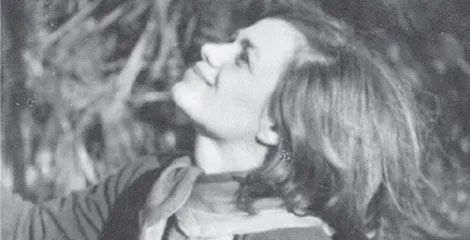
"Alice Sampaio published the first volume of Penelope in 1977, and it was the last work published during the author's lifetime. Penelope was a major writing project for which the author had envisaged twelve volumes. With no time left to write them, she left us the second volume, hitherto unpublished, ready for publication. The time has come to bring together and publish the two volumes of Penelope, at a time that marks forty years since Alice Sampaio's death. (...)
Alice Sampaio rewrote Ulysses with stories and conversations, with her typewriter. She dreamt Penelope with her body, with the earth, with time itself. It's so old that we find ourselves in it - it's also so recent, isn't it?
Between the silences of the stars, Alice Sampaio erased and rewrote the texts, although the breath of reading takes us back to an idea of tireless, endless, infinite writing. Infinite as the stars are, as poems are." (From the foreword by Cátia Terrinca and Ricardo Boléo.)
The book is on sale in bookshops in Lisbon, including Livraria Paper Tiger and Snob Bookshop
| author | Alice Sampaio |
| publisher | Paper Tiger |
| year of publication | 2023 |
| no. of pages | 520 |
Luísa Demétrio Raposo
The Fire of the Fire

Luísa Demétrio Raposo seeks female fulfilment through an openly erotic form of literature, in which the word occupies the mouth, the mouth as an obviously sexual place, inviting the voice to cross the skin with a shiver. The mouth says, whispers, shouts, hides, devours, sings any word that excites it and urges the body to its own pleasure: we are made of pleasures. And when we want to know the world and interrupt the darkness, we cross our mothers' bodies walking on a funnel of sublime pain that makes us arrive, unrecognisable and unimaginable, outside the body. And the kiss of the vulva is our first oracle. We are born from the pleasure with which our mothers negotiate death. The romantic and loving ideal that oppresses the female body that "gives birth" is vigorously challenged by Luísa Demétrio Raposo - who defies time because she crosses it: Luísa is after the academies, after the orders, after the congresses. The freedom with which she writes affronts those who have never loved, written, fucked or given birth. (From the foreword by Cátia Terrina and Ricardo Boléo)
- Afterword by Maria Estela Guedes.
| author | Luísa Demétrio Raposo |
| publisher | Paper Tiger |
| year of publication | 2023 |
| no. of pages | 136 |
Salette Tavares
Letters from Pedro Sete
This volume brings together the work of Salette Tavares on her character (pseudonym? heteronym?) Pedro Sete. It includes the 1965 book 14563 Letras de Pedro Sete, the 1967 "Letter to Pedro Sete" and "Two Almost Unpublished Poems by Pedro Sete". Includes an afterword by Rui Lopo.
| author | Salette Tavares |
| publisher | Paper Tiger |
| year of publication | 2024 |
Maria Mello Giraldes
Collected Works
"Maria Mello Giraldes writes initiatively about the body, being a body, the body as a frontier and... silence. She writes, it seems, as a form of rebirth or reincarnation - a carnal act - but a light one, with an open direction to the past and the future at the same time. Time, beyond the edges of the skin, has the time of the bones and the stre[1]las - that matter where motherhood hides and gives us back our face in the indivisible face of our children. If we are all children, then we are all made of the cosmic future that Mary, the mother, summons for her work." (From the foreword by Cátia Terrinca and Ricardo Boléo.) This volume brings together the poetic work of Maria Mello Giraldes, including 5 Espaços (&etc, 1983) and Seis Momentos (Imprensa Nacional-Casa da Moeda, 1988), as well as the unpublished Milénios and Memória da Matéria. Afterword by Isabel de Sá.
| author | Maria Mello Giraldes |
| publisher | Paper Tiger |
| year of publication | 2024 |
Orlanda Amarílis
Stories

"Publishing Orlanda Amarílis' short stories is like going inside a volcano and listening to the lava of someone who, over the course of so many lives, has been silenced. The erasure of several years that we want to subvert is not only the one that falls on the work of the published author: it is the fictionalised lives that parade and are mapped out in her short stories, undoing ghosts and voids in order to understand a root that, in the end, is really impossible to pull out. Orlanda Amarílis describes places and characters through language, making them absolutely transversal, imagined but real. The notes of words in Cape Verdean Creole don't form sentences, but idiomatic expressions. As we read, we often wondered what language Orlanda Amarílis would have written in today, after the Cape Verdean language had asserted itself beyond Creole, from a political point of view. Perhaps these short stories were not the heritage of the Portuguese language. We don't know. We won't know. If they are, let our coeval thinking help us to visualise the colonial weight on the body of this work and on each of its characters." (From the foreword by Cátia Terrinca and Ricardo Boléo)
Book in the Ventriloquia collection, in partnership with Um Colectivo.
| year of publication | 2024 |
| author | Orlanda Amarílis |
| publisher | Paper Tiger |
| no. of pages | 432 |

